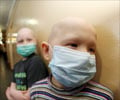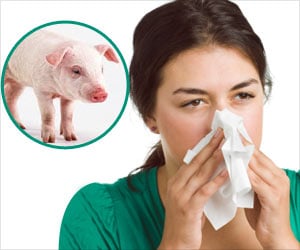Children should be among the first people to be vaccinated against swine flu if health officials hope to temper the severity of the epidemic, a study published Thursday has found.
That's because, as every parent knows, schools are prime breeding grounds for spreading the flu and children are expected to experience the highest illness rate."If you have little vaccine available, you should vaccinate high risk people first to avoid death but then vaccinate children," said co-author Elizabeth Halloran of the Center for Statistics and Quantitative Infectious Disease at the University of Washington.
"If children could be vaccinated it will reduce a lot of the transmission and if your child doesn't come home sick from school then you don't have to stay home from work, which can be a real problem for a lot of people."
By studying early reports of the swine flu's spread, Halloran and her team were able to determine that the typical student will infect an average of 2.4 other children at school before he or she is sick enough to be kept home.
The overall transmission rate was estimated to be 1.3 to 1.7 people sickened by every infected person, the study published in the journal Science found.
About a third of those infected will likely not get sick enough to show symptoms.
Advertisement
That is still a relatively low transmission and illness rate, Halloran said.
Advertisement
Within households, an average of about one in every four people will get sick once a family member comes home with swine flu, the study found.
The World Health Organization has warned of a possible A(H1N1) vaccine shortage as winter -- and the regular flu season -- approaches in the northern hemisphere.
While China plans to begin vaccinations this week, large scale programs are not expected to begin in most other countries until October at the earliest.
The study predicted that the swine flu epidemic will peak in October, which means most people will not yet have received the vaccination.
Vaccinating just 30 percent of the population would postpone the epidemic's peak by about 40 days, buying people more time to get vaccinated.
The illness rate could fall from 32 to 15 percent or less if 70 percent of the population is vaccinated, the study found.
"Although social distancing and the use of antiviral agents can be partially effective at slowing spread, vaccination remains the most effective means of pandemic influenza control," the study concluded.
Source-AFP
SRM










